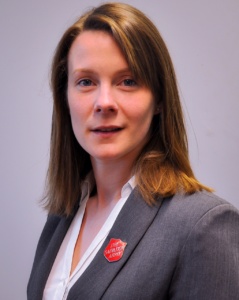Domestic Slavery is the third most prevalent form of Modern Slavery, and I encounter victims all too regularly. In 2016, 1 in 10 female Modern Slavery victims who were helped by The Salvation Army were Nigerian.

Emilie Martin is Operations Manager for The Salvation Army’s Anti-Trafficking and Modern Slavery Unit, delivering specialist support to potential victims of modern slavery. In a press release made available to AFRICAN VOICE, Emilie said, “We once provided specialist support to a woman brought to the UK as a young orphan. She had been promised a good, decent job in the UK and wasn’t worldly-wise so when she was told ‘you have to make these men happy’, she thought it meant only domestic duties. Despite witnessing the horrific murder of her parents in her home country, she said her most traumatic experience was suffering repeated rapes whilst being held as a slave.
As Operations Manager my team and I help victims from the point of referral – when they are first identified as needing help and start to go through the National Referral Mechanism (NRM). The NRM team has 5 days to decide whether to grant the individual reasonable grounds that they are a potential victim of modern slavery – during which time they’re given safe accommodation. Regardless of their immigration status, if someone is confirmed as a victim, and needs a safe place to stay, The Salvation Army transports them to a safe house. The moment victims enter a safe house, or start to receive outreach support from us, we do everything to make them feel comfortable and show them they are free again. One victim was so traumatised she didn’t trust anyone around her. It was the middle of winter and freezing, but we opened every door and window, and sat with her to show her that she was free to leave if she wanted to.
Again, irrespective of immigration status, all victims are granted a period of reflection and recovery for a minimum of 45 days, but most stay at our safe houses for an average of 90 days and in outreach support for more than 150 days. During this time we help victims to regain control of their lives. We help with whatever is needed – from medical or psychological care, to practical things like clothing, interpreting language, and legal support. Individuals eventually become more confident and independent, and often a community forms within safe houses.
One Nigerian lady we supported was at the age of 10 made to live with a couple in the UK who she was told to refer to as ‘mum and dad’. Years after her arrival she was allowed to enrol at school but wasn’t allowed to speak to the other students and would be punished for inviting friends to come to the house. When she turned 16, ‘dad’ began to sexually harass her and she ran away. Eventually, she met a man who took her to Citizens Advice to get help. After receiving support from The Salvation Army, she has gone on to complete her A-levels with support from a circle of friends from college and the church.
I never fail to be shocked by what I see. I suppose that is a good thing. Really, people need to come face-to-face with Domestic Slavery to understand the long term impact on someone’s life. It is happening – it’s out there in our communities. If we face up to this problem, we can better help to protect the victims.”
To report concerns, seek advice, or get help call the UK Modern Slavery Helpline 08000 121 700 or visit the website www.modernslaveryhelpline.org.
For more information about the work of The Salvation Army go to www.salvationarmy.org.uk/human-trafficking









